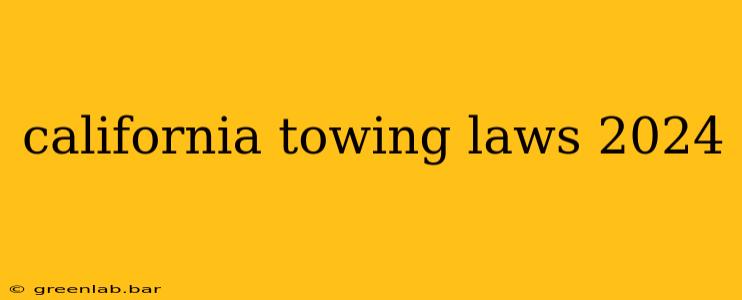California has some of the strictest towing laws in the nation, designed to protect vehicle owners from unfair or illegal towing practices. Understanding these laws is crucial for both drivers and property owners. This comprehensive guide will break down the key aspects of California towing regulations in 2024, helping you avoid costly and frustrating situations.
Understanding Your Rights: Key Aspects of California Towing Laws
California's towing laws are complex, but here are some essential points to remember:
Proper Notice and Signage:
Before your vehicle can be towed from private property, the property owner must meet specific requirements regarding signage. These signs must be:
- Clearly visible: Easily readable from a driver's perspective.
- Posted conspicuously: Located in prominent places where drivers are likely to see them before parking.
- Specific about towing regulations: Clearly stating the towing company's name, contact information, and the conditions under which a vehicle will be towed. Vague or ambiguous signage is not sufficient.
Failure to meet these signage requirements can render the tow illegal, and you may be entitled to reimbursement for towing and storage fees.
Towing from Private Property:
Towing from private property is governed by a few key factors:
- Enforceable parking rules: The property owner must have clear and legally enforceable parking rules.
- Proper authorization: The tow must be authorized by the property owner or their designated representative. Simply observing a vehicle violating parking rules does not automatically authorize towing.
- No discrimination: The property owner cannot discriminate based on race, religion, or any other protected characteristic when enforcing parking rules and authorizing tows.
Towing from Public Property:
Towing from public property is subject to different rules. Typically, vehicles are towed for violations such as:
- Parking in a prohibited zone: This includes areas designated for emergency vehicles, loading zones, bus stops, or other restricted areas.
- Blocking traffic: Obstructing the flow of traffic is a common reason for towing.
- Expired registration or license plates: Authorities may tow vehicles with expired tags or plates.
- Vehicle abandonment: Vehicles left unattended for an extended period, often determined by local ordinances, may be towed.
It's vital to check local ordinances for specific regulations concerning public property towing in your area.
Fees and Charges:
California law strictly regulates towing and storage fees. Property owners and towing companies cannot charge excessive or unreasonable fees. These fees are usually set by local municipalities or through a state regulatory body, and exceeding these limits is illegal. Always obtain a detailed receipt showing all fees.
Recovering Your Vehicle:
If your vehicle has been towed, you have the right to:
- Immediate access to information: The towing company must provide you with information about the location of your vehicle and the associated fees.
- Reasonable access to retrieve your vehicle: The towing company cannot unreasonably delay or obstruct your attempt to retrieve your vehicle.
- Dispute unreasonable fees: If you believe the fees are excessive or unjustified, you can challenge them through legal means.
Protecting Yourself: Tips for Drivers and Property Owners
For Drivers:
- Park legally: Always adhere to parking regulations, both on private and public property.
- Read signage carefully: Pay close attention to parking signs and regulations.
- Take pictures: If you believe your vehicle has been towed illegally, take photos of the parking area and any signage.
- Contact the towing company immediately: Obtain all necessary information regarding fees and procedures.
For Property Owners:
- Consult with legal counsel: Ensure your parking regulations comply with California law.
- Clearly post signage: Use clear, visible, and unambiguous signage that complies with state regulations.
- Authorize towing only when necessary: Ensure you only authorize towing when appropriate and in accordance with the law.
- Maintain thorough records: Keep accurate records of all towing authorizations, fees, and communications with the towing company.
Understanding California's towing laws is essential for both drivers and property owners. By following these guidelines and seeking legal advice when needed, you can navigate the complexities of towing regulations and protect your rights. Remember, this information is for educational purposes and should not be considered legal advice. Always consult with an attorney for specific legal guidance.

